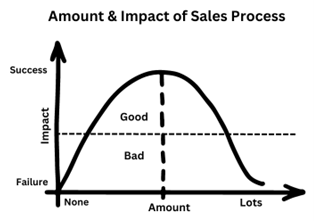In any given business environment, there will generally be two types of people:
- Those who create systems and believe that if everyone just followed the process life would be much simpler – to just get it done and get it right.
- Those who see systems as unnecessary layers of complexity that are time consuming with no real return, limiting their autonomy or ability to just get on with what they do best.
The optimal position, however, is somewhere in the middle but until this point is reached there will likely be a level of contention between the two groups.
Systems are not the enemy or the saving grace – nothing is purely good or bad in its own right. The key to gaining engagement from all parties lays in getting the balance right.
One of the most common areas that we see the tug of war around systems implementation is within the Sales function of businesses.
Salespeople, by their inherent nature will generally prefer to be interacting with their customers, building relationships and closing deals rather than spending valuable time updating complex CRMs or data systems, especially if they feel like it is a “Box ticking” activity.
Head office or management need systems and data to analyse business performance, predict future results, identify potential risks and direct resources to the most valuable areas. The more oversight they have, the better they are at strategically managing the business.
Systems should play to the strengths of all stakeholders with a level of negotiation or give and take.
Albert Einstein said “Things should be as simple as possible but no simpler.”
This is especially relevant for Sales Processes and Systems where too much AND too little process will hinder performance. Even the most spontaneous person will benefit from appropriate organisation, but when we go over the top it will stifle our high performing people who can feel drained through the endless hoops to jump through.

When the right balance is reached, effective systems will provide a myriad of benefits to all involved including:
- Consistency and reliability– without systems, processes can be chaotic and important tasks get missed which can impact results and customer satisfaction. Systems ensure things don’t slip through the cracks.
- Increased flow and decreased stress – when systems are in place to ensure that things get done it reduces the reliance on managing everything in our heads. Trying to remember all the little things can create stress and detract from being able to focus on the big things that really matter. By reducing the cognitive load systems can enhance productivity, wellbeing and focus.
- Data driven decisions – gut feelings are no longer enough. Even though we think we know what is happening, the numbers tell a story around trends that help us make informed decisions.
- Scalability and continuous improvement – as businesses grow, so do the complexities. Systems are essential for onboarding new team members and scaling operations without losing control – ensuring that processes remain effective even as the volume of work increases through continuous improvement.
- Efficiency and time management – time is a precious commodity in today’s marketplace. When systems prioritise the high value activities that must be completed it ensures that the right things are done at the right times so that everyone can get on with doing what they do best.
- Reduced risk and increased freedom– when systems can remove the human error element through appropriate levels of control, this frees up capacity to think creatively on a higher level (knowing that the base level is under control). Without this time and energy is spent on lower level activities. Freedom and flexibility are earned through discipline and structure which are two sides of the same coin.
- Accountability and transparency – Systems create a transparent environment where everyone’s roles, responsibilities and steps to success are clear. Systems enable teams to work cohesively towards common goals. Whether it’s a project management tool that tracks progress and deadlines or a standard operating procedure that ensures quality and consistency, systems create a dependable environment where tasks are completed efficiently and effectively.
Conclusion
While the idea of systems might initially seem unappealing or counterintuitive, when designed effectively they can enhance creativity, freedom and simplicity – the very things that we all crave and need in order to pursue our passions.
Mark Zuckenberg and Steve Jobs famously wore the same outfits to work every day – the reason for this is it eliminates decisions, provides structure, reduces stress and frees up energy to focus on high level priorities.
Embracing systems can transform teams from good to great, ensuring sustained success and growth. This can only happen when all parties see the benefits or freedom that is earned through implementing appropriate levels of systems around what matters most.
When we get this right, everything becomes easier.
The better it gets, the better it gets!
At Shine Executive, we love supporting organisations to create a high-performance culture by bringing out the best in their people.
We are here to help with speaking, consulting, training, conferences, coaching or offsite events and specialise in the following areas:
High Performing Teams | Leadership | Sales Training | EQ & Neuroscience | Financial Services Sales & Service | DISC Personality Profiles | Five Behaviours of Cohesive Teams | Positive Psychology | GROWTH Coaching
Our bespoke people and performance solutions are created to meet your unique business needs, time available and working environment – so if you have something that’s important to you why not Book your free 30 minute call now to discuss. We’d love to hear from you.
Or contact us at [email protected] or +61 423 936090.




